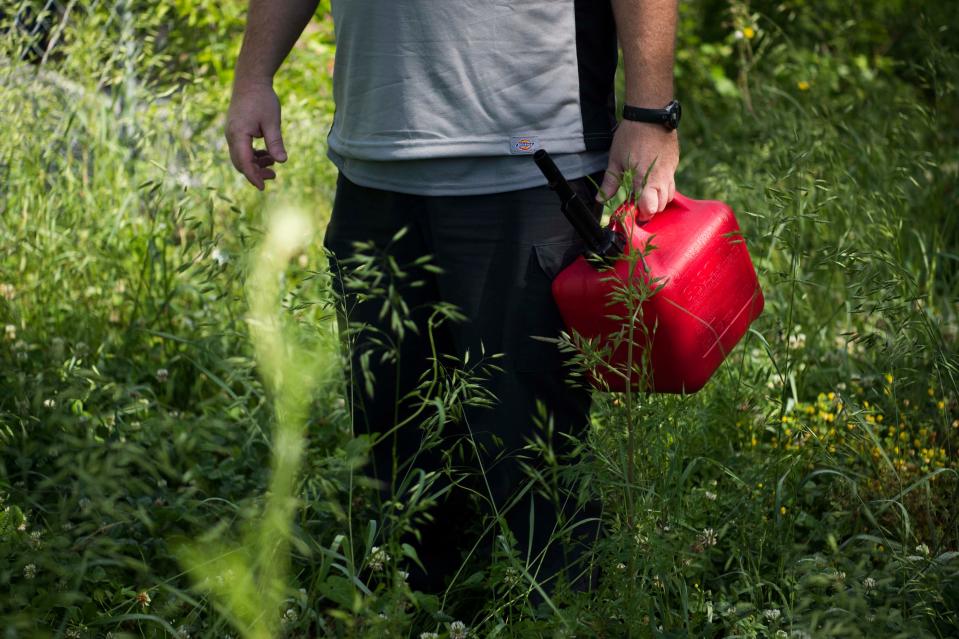West Nile virus found in mosquitoes in Knoxville. Could they bring malaria here, too?
Swatting away mosquitoes and scratching their itchy bites is bad enough. Now these annoying pests also have been found to transmit at least one serious illness in Knoxville this summer.
Mosquitoes from the Inskip area of Knoxville recently tested positive for West Nile virus, the Knox County Health Department reported July 26.
The health department will spray to kill mosquitoes in that area between 9 p.m. and 2 a.m. July 27, weather permitting, according to an announcement. Residents are asked to stay inside during spraying and to keep pets inside or in backyards.
This week marks the first report of West Nile virus in the Knoxville area this summer, but the virus had already been found in mosquitoes in Nashville in June. Around the same time, the chance of another serious illness spread by mosquitoes was raised as cases of locally acquired malaria were reported in the United States for first time in 20 years.
The Knox County Health Department aims to test mosquitoes for illnesses at least once a week during mosquito season, which begins in early spring and lasts through the fall.
“Even though we have the mosquitoes capable of transmitting malaria here in East Tennessee, we are not concerned for local transmission currently as case counts remain low in more Southern states,” Knox County Health Department spokesperson Kaylee Coffman told Knox News in a statement.
At least eight locally transmitted malaria cases have been reported in Texas and Florida this year. Locally acquired malaria occurs when an infected mosquito bites a person who has not recently traveled internationally, according to the Centers for Disease Control and Prevention.
Because localized malaria outbreaks are rare, last occurring in 2003, the Texas and Florida cases prompted the CDC to issue an alert for health officials about the risk as travel increased for the summer.
How are mosquitoes tested in Knox County?
Knox County Health Department sprays larvicide in approximately 100 locations, beginning in the spring, to prevent mosquito breeding. The department is currently collecting samples in 13 areas at least once a week. The samples are sent to a Nashville lab to be tested for diseases.
Testing frequency during 2023 has been consistent with years past despite mosquito-borne illnesses being reported in Middle Tennessee and other states.
When sampling results in a positive test, as in Inskip, the area where it was collected is sprayed to kill mosquitoes and larvae. A fog truck spraying insecticides within a one-mile area also is deployed.
Eight out of every 10 people infected with West Nile virus do not develop any symptoms, the CDC states. Some people might get a fever or symptoms including headache, body aches, joint pains, vomiting, diarrhea or rash.
Malaria symptoms include fever and flu-like illness, such as chills, headache, muscle aches and tiredness, according to the CDC. It can become life-threatening if left untreated.
Should you be concerned about a rise in malaria cases?
Malaria was eliminated as major public health issue in the U.S. by the early 1950s, according to the CDC. Approximately 2,000 cases are reported in the country every year, primarily in returning international travelers and immigrants.
Despite the Florida and Texas cases, experts do not predict malaria will become a widespread concern in the United States. But climate change and warmer temperatures could bring more localized cases than have been reported in recent decades.
“I do not think malaria is going to gain a foothold,” Dr. Shauna Gunaratne, an expert in tropical medicine, told USA TODAY.
“However, we are anticipating a lot of travel this upcoming summer, and the CDC is advising people and health care providers to be vigilant about the possibility of more imported malaria cases,” she continued.
“We shouldn’t be surprised that we’re going to have sporadic outbreaks again. … The ingredients are here for transmission to happen, but we have a lot of safeguards," said Dr. Thom Eisele, professor and director of the Center for Applied Malaria Research and Evaluation at Tulane University School of Public Health and Tropical Medicine.
Mosquitoes thrive in warm and humid weather. The number of "mosquito days” has increased by 16, on average, in more than 170 U.S. locations over the past several decades, according to a May 2023 report by the nonprofit climate science research organization Climate Central.
Effective safeguards in place in the U.S. include monitoring and testing mosquitoes and treatment with medicines, according to the CDC.

How to prevent mosquito swarms this summer
Mosquitoes require standing water to reproduce quickly and in large quantities. The CDC recommends emptying standing water from likely breeding grounds like tires, buckets, planters, flowerpot saucers, birdbaths and trashcans once a week.
“Mosquitoes like cool, shady places too,” Coffman said. “It's important to trim back hedges and keep grass cut. Wear mosquito repellent that contains DEET or other mosquito-repellent ingredients. Wear long sleeves and long pants when possible.”
Devarrick Turner is a trending news reporter. Email devarrick.turner@knoxnews.com. Twitter @dturner1208.
Support strong local journalism by subscribing at knoxnews.com/subscribe.
This article originally appeared on Knoxville News Sentinel: West Nile virus found in mosquitoes in Knoxville. Could malaria follow?

